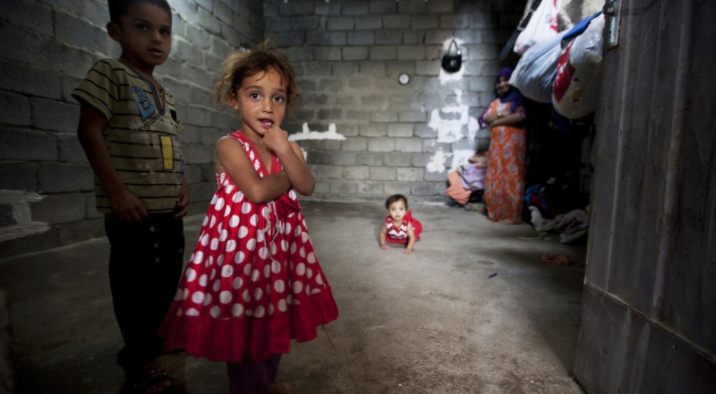Internal displacement throughout the two years of hostility that Iraq has experienced, subsequent to the fall of its second largest city to Islamic State militants, has come to symbolise an unresponsive government.
While active in fighting terrorism, it has failed to stem the spiralling problem of displacement. Mosul’s collapse left an estimate two million displaced, a figure which has since almost doubled to 3.2 million, since the terror group secured a firm grip over two of Al-Anbar province’s most strategic cities, Ramadi and later Fallujah.
As battles continue unabated, displacement escalates, leaving entire villages empty and transforming neighbourhoods into zones of war. These numbers lay bare the sheer magnitude of a hidden crisis, unworthy to the broader, juicer debates, on Iraq, currently being had.
In skirting around these problems, international aid organisations have relocated their efforts to the Kurdish controlled north, where encampments laden with flimsy shelters and unfurnished concrete dwellings have been erected. While many were founded to serve only as transit camps, these temporary sites now exude a semblance of permanency as mature slums, where many will be spending their second winter away from home.
What is needed still, as the situation steadily deteriorates, is a greater understanding of the needs of communities trapped inside IS-strong holds, ahead of the coldest months of this year’s winter.
The burden weighs heavily not only on international humanitarian agencies but also state authorities, recently confronted by winter floods, funding shortfalls, and budget constraints. The accumulative result, as UNHCR’s senior public information officer, Caroline Gluck, told the Diagonal, has seen relief programmes “cut to the bone” at a time when they are most needed. In light of these impediments, survival, in the daily sense, has become one of the agency’s most pressing concerns, with added pressure to act in a timely manner to fulfil the winter needs of IDPs.
The agonies of displacement were most felt during last year’s winter season. For families that experienced multiple deprivations – little to no access to relief items or fuel, and living outside of official encampments – winter deaths were not uncommon. The informal spaces of refuge where many died, as Gluck noted, “are poorly insulated and not well adapted” to Iraq’s scorching summers and merciless winters. Winter, she added, is unavoidably “difficult for children, the elderly and those with chronic diseases who are especially at risk of exposure”. Due to obvious obstacles, it is difficult to pin down accurate figures of last year’s winter death toll, and ever more difficult to predict how many this year could be struck by a similar fate.
In spite of the absence of sufficient funds to rehouse those most at risk, the UN has been moving quickly to prevent a repeat of 2014. Such determination, according to Gluck, has seen them distribute supplementary household items to 60,000 internally displaced families. From as early as October this year, blankets, kerosene stoves, and jerry cans for collecting fresh water were circulated to high-risk communities. Winter clothing kits have also been widely distributed to more than 200,000 children and UNICEF moved further, equipping schools with oil heaters, insulation and emergency water and sanitation services to displaced peoples. Part of the problem is that there is no quick fix, given that necessary funding to stimulate improvements in the context of raging conflict is not available.
Even if relocation offers a practical solution for the prevention of winter related deaths, funding is a prerequisite that is not readily available to accommodate such a move. Camps, as Gluck describes, represent “a solution for a minority of people while the much larger majority has found other shelter alternatives”, the choice of which hinges upon one’s financial capabilities. The situation today is not like before. Options, even for families once able to rent privately, are now slim as wealth dries up. Relocation to remote rural settings, informal shanties, and flight (in the more extreme of cases) are becoming increasingly popular, not by choice but by brutal circumstances. Gluck explained that many families have exhausted all their savings, without alternative solutions left to pursue, unable to plan for the long-term.
The speed at which humanitarian actors mobilise their efforts is not the only obstacle organisations such as the UN face. The wreckage caused by last October’s torrential rain affected an estimated 84,000 displaced people, if not more, mainly in areas concentrated around the capital. The Association of Muslim Scholars in Iraq (AMSI) provided emergency relief to families residing in a camp situated in Haswa, Babil province, replacing tents destroyed in the floods with prefabricated caravans. Winter preparations, as AMSI’s work demonstrates, cannot be divorced from plans to reverse the damage caused by unprecedented floods.
Gluck warns that these specific demands and programmes for winter “have put a high priority on decent shelter options but with fund shortages to grapple with” the UN, as well of the Iraqi government, “are far from being able to deliver solutions to all of the Iraqis who need help”.
Source http://www.the-diagonal.com/?p=66


 RSS Feed
RSS Feed